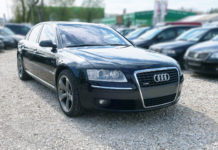The mating surface of the wheel and the brake rotor should be always clean without any corrosion. And why? Well, because of numerous reasons:
1. If rust builds up on these places then the wheel is not going to sit perfectly even on the brake rotor which will cause vibrations during driving or during braking.
2. Because of the rust the wheel is going to get stuck onto the brake rotor so you will need to use smaller or bigger force to remove it which is definitely not the best, mainly when you get a flat tire and you want to change your wheel as fast as possible.
3. And last but not least in the very worst case when there is really a lot rust there, well then the wheel can come a bit loose too.

How to clean these surfaces?
To clean these surfaces the very best is to buy a wheel hub cleaning tool which you can simply mount onto a screw gun, or onto a regualr drill as well. These cleaning tools are usually expensive as fuck, considering the fact that it’s just a simple tool, I mean what tha fuck is wrong with these people?
By the way nobody is sponsoring this article/video so I’m not interested in putting a link for this kind of a tool, but you can use Google to find one.
Cleaning the wheel
I would highly recommend to use water during cleaning since this way that fucking dust is not going to fly around + you won’t remove that much material during “sanding”. During cleaning don’t push the tool like crazy and don’t spin it too fast either, so slowly and evenly try to clean the surface. If the surface is perfectly smooth then you are done with the wheel.
Cleaning the brake rotor
Now the brake rotor. In this case the method is the same: so use water, don’t push the tool like crazy and don’t spin that shit too fast either. If the surface is perfectly smooth then you are done with the brake rotor.
Of course if you have a different car with the wheel studs hanging out then you either buy a smaller wheel hub cleaning tool or if you have a lot of time then you can remove the whole brake rotor to clean it.
“After cleaning dry out the surface-preferably with compressed air.“
Still got vibrations during driving/braking?
The other causes of vibrations can be:
–unbalanced wheels (some cars are more sensitive to unbalanced wheels so the best is to find a place where they have a special road force wheel balancing machine)
–bent wheels (after hitting a big pothole you can end up with a bent wheel, and even a slightly bent wheel can cause vibrations)
–old or damaged tires
–rusted wheels hubs (if you are replacing the brake rotors then you always have to clean the wheel hubs basically the same way as I described in this article)
–warped brake rotors
–uneven brake pad deposit on the brake rotor
–faulty driveshafts
–bent wheel hub (not extremely common but can happen)
–worn wheel bearings (in some cases even the worn wheel bearings can cause vibrations)
-worn/unbalanced propshaft (RWD, AWD and 4WD cars)














